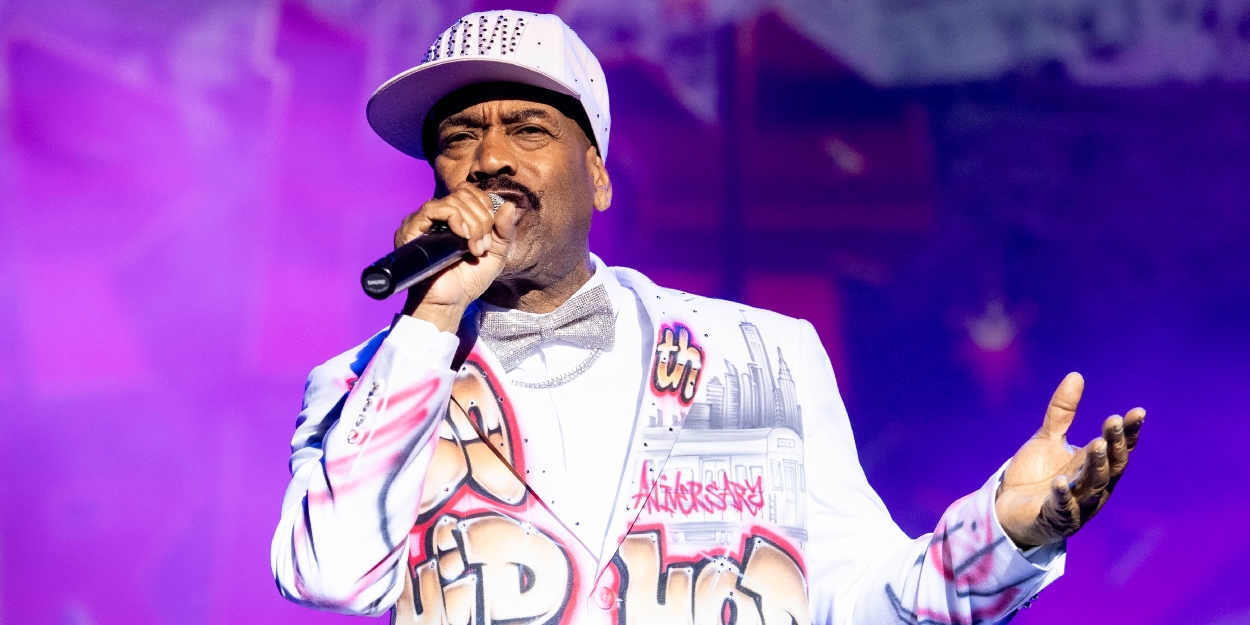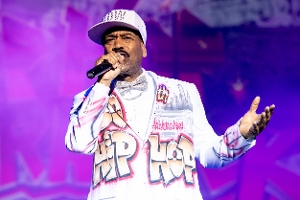Interview: Kurtis Blow of THE HIP HOP NUTCRACKER at Palace Theatre
Rapper finds Christmas spirit in being involved with HIP HOP NUTCRACKER


Crooner Andy Williams is known for his Yuletide classic, “It’s The Most Wonderful Time of the Year.” For Kurtis Blow, the first rapper to sign with a major record label, the song is more of a mission statement than it is a Christmas song.
Blow will be a special guest MC for THE HIP HOP NUTCRACKER that rolls into the Palace Theatre (34 W. Broad St. in downtown Columbus) Dec. 7.
“The holiday season is my favorite time of the year,” said Blow, whose tune “Christmas Rappin” became the first rap song to sell over 400,000 copies in 1979. “That song is my baby, my favorite.
“Broadcasters around the world play ‘Christmas Rappin’ alongside Nat King Cole and Mariah Carey and all the great Christmas songs you hear this time of year. I feel like I am a part of that bunch.”
Eleven years ago, Blow added to his holiday legacy through his association with THE HIP HOP NUTCRACKER. After hearing Blow perform at an event, an agent encouraged the rapper to see the show and get involved with it.
“I went THE HIP HOP what?” said Blow, who was calling from Richmond, Va. where the 15-show tour began on Nov. 29.
What he saw at the HIP HOP NUTCRACKER defied his imagination. The show is the brainchild of Tony and Olivier award nominated choreographer/director Jennifer Weber. Weber throws Blow, a dozen dancers, a violinist, and a mishmash of hip hop music and Tchaikovsky’s traditional NUTCRACKER score and throws it into a blender. The result is a unique experience for everyone, according to Blow.
“Man, I was amazed when I walked in. I saw this All Star dance team of B Boys and B Girls just break dancing to classical music,” Blow said. “I said right there, ‘Oh my God, this is so amazing. I must be a part of this.’ That was 11 years ago, and we are still here.”
From his first album, Blow has been an avid supporter of the fusion of hip hop and other forms of music. His first album, the self-titled “Kurtis Blow,” married rock and roll and rap and country and western and rap on the song “Way Out West.” When Blow produced the Fat Boys’ self-titled debut in 1984, the trio merged rap and reggae on “Hard Core Reggae.”
Blow said mixing the traditional THE NUTCRACKER he grew up with hip hop was a divine stroke of genius.
“I want to give a shout out to our choreographer, our leader Jennifer Weber, who comes up with these great additions and transitions,” he said. “At THE HIP HOP NUTCRACKER, you'll see the actual essence of hip hop with break dancing, acrobatics and choreography all coordinated to the classical music.”
RISKY BUSINESS
Perhaps Blow’s willingness to take a chance on THE HIP HOP NUTCRACKER stems back to Mercury Records taking a chance on him when he was 20 years old. Prior to that, rap music had been relegated to barbeques, street performances and clubs. When Blow’s “Christmas Rappin” sold over 400,000 records, Mercury wanted more. His second song “The Breaks,” was the first rap record to go gold by selling over 500,000 records.
“It was the best time of my life,” Blow said wistfully. “Here I was, a young kid, 20 years old, and I got the opportunity to travel the world.
“I recently ran into Beverly Page (who worked in the publicity department for Mercury Records). She said, you used to call me every day at 12, like clockwork, saying ‘What's happening? What are we doing today?’
“I remember I told her, ‘I need you to send me all over the world. I want to meet all my heroes.’ I was going to Paris, to London, to Tokyo. I would do press for five hours a day. That was a big part of my career: going out and representing hip-hop to an audience who had never seen it.”
Blow was successful in the “meeting my heroes” part of the mission. In 1985, Blow was part of the “Sun City,” a record encouraging artists to boycott South Africa because of their apartheid practices. Some of the biggest names in the business were involved with it including Miles Davis, Bruce Springsteen, Bob Dylan, Grandmaster Melle Mel, Herbie Hancock, Keith Richards, Pete Townshend, Ringo Star, Run DMC, George Clinton, David Ruffin and Eddie Kendricks to name a few.
But before that, he had a very full photo album with luminaries like James Brown, Stevie Wonder, Diana Ross, and Aretha Franklin. His favorite story was how Beverly Page had worked to get Blow on to the guest list for Michael Jackson’s 40th birthday. At the party, Jackson pulled Blow aside and quizzed him about his background and his roots. “Michael told me, ‘Never forget where you came from,’” Blow said.
EIGHT MILLION STORIES
Blow says he has never forgotten growing up in the Bronx. In his song, “Eight Million Stories,” Blow writes: “There are 8 million stories in the naked city; Some ice cold and told without pity.” If one waits long enough, Blow will tell all of them.
While his rise to fame was meteoric (cranking out 10 albums in a decade), he said it took its toll on him. Since he started out, the rap lyrics, in general, have become darker, more misogynistic, and self-indulgent. Asked what the biggest thing he had to overcome was, Blow answered with a knowing laugh.
“I’d say the big three: sex, drugs and hip hop. Sex and drugs are self-explanatory, but when you talk about hip-hop, what I had to overcome is the lyrical content.
“I always try to be positive. Anytime is the right time to do the right thing. So, let's do the right thing. We have this ability to change the world. But don't tear down your community. Let's lift up your community.”
A SECOND CHANCE
If that sounds more like a gospel preacher than a rap pioneer, it’s because Blow became an ordained minister in 1996 and currently is the leader of the Hip Hop Church.
“I've seen story after story after story, miracle after miracle,” Blow said. “I am a walking, living, breathing testimony that God is still in the miracle business.”
Blow has had a series of life threatening events, including seven surgeries. In 2020, the rapper had to undergo a heart transplant after suffering an aortic tear.
“I was in the UCLA hospital for an aorta operation. The next day, the aorta on the other side ruptured,” Blow said. “It was a miracle I was in the hospital. If I were anywhere else, I couldn't make it to the hospital.”
Blow knows very little about who his new heart originally belonged to, only that it was from an African American athletic male, who died at 34. The experience made Blow became a organ donor and he encourages everyone to do so when they get their driver's license.
“I'm just so grateful to his family, to him. It’s hard to grasp somebody had to die for me to live,” Blow said. “
“I feel like I have been given another chance to get it right, another chance to show love and represent what God has taught me.”
Photo credit: Tellem Grody PR
.jpg)
.jpg)
Comments
Videos

